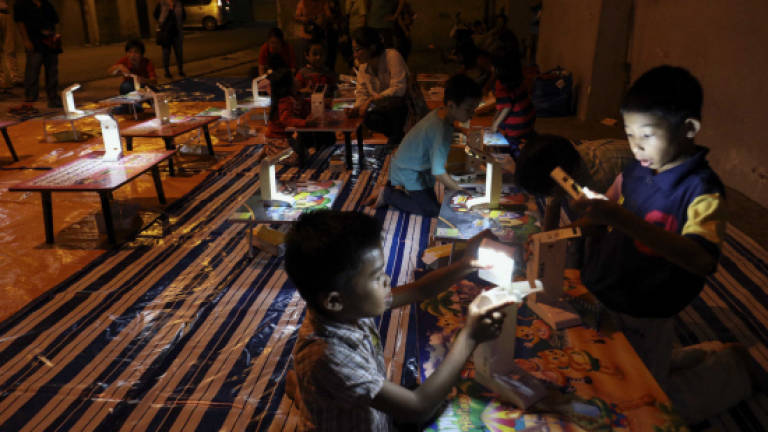Ramadan story: Children in Chow Kit Road

KUALA LUMPUR: Amidst the loud traffic along Jalan Tuanku Abdul Rahman, children as young as four-years-old excitedly donned their prayer shawls after breaking fast behind a building on Sunday night.
With the assistance of Buku Jalanan Chow Kit (BJCK) volunteers, prayer mats were laid out on the hard floor before the start of a three-hour art and reading class at the loading bay of Alka Ria Textile.
Minutes later, school books, crayons, pens, and children's sized-tables were placed on mats adorned with alphabets that are usually used in kindergartens. The children's loud voices filled the humid air as they sat around each table with a volunteer to oversee their work.
Oblivious to passerbys, the children attempted to write on their own stories about the upcoming Hari Raya festivity. An eight-year-old girl was struggling to pen her thoughts, and kept sneaking at her friend's handiwork. Their teacher, a teenager, sees this and patiently guides the girl to jot down a list of activities meant for the celebration.
"I was one of them, so I know it can be difficult to focus as they're still too young. It's important to give back especially to the younger ones, and I'm proud to help out anyway I can," said the 15-year-old, fondly known as Dayang.
"I learned about BJCK as I walked with my mother here one evening. We wondered why there was so much fuss with people queuing for food. Later, I understood free classes were conducted too. Mak decided I should join them since I needed help with my UPSR exams.
"I'm luckier because we have a home – other parents are still struggling (financially)," Dayang lamented.
Siti Rahayu Baharin, one of BJCK's founders, expressed delight in Dayang's progress, after the NGO's existence three years ago.
She explained the children are not homeless, but are from lower-income families.
"Some believe that Chow Kit is a centre for homeless. Yes, there are a few living on the street.
"But, they consider this area as their kampung. It's only that they're oppressed by the economic factors — for instance, a room rental here is expensive — RM25 per day.
"They are the true idiom is 'kais pagi makan pagi, kais petang makan petang'. This is true because they work in the day, and at night they have to pay their rental to avoid being evacuated from their temporary home which can affect their children," she said.
She added although the classes, which is conducted twice a week on Friday and Sunday evenings, still offers hope for the community.
"Do you think through these two-day classes we can change their academic performances? "No, we can't. We wouldn't be able to do so. If we were to look at the current Malaysian school syllabus, my children wouldn't be able to catch up. Some are not able to read.
"But, why are we still here although it seems impossible to push their academic performance? It's because we want to give them hope despite their predicament – that it is possible to move forward," she said, while looking at the spot where a few had recited their stories to the group.
"Although some couldn't tell their story, we wanted to instil a sense confidence being themselves and not ashamed of their circumstances. We also want them to grow up being independent and contribute to the society," she said.
When asked on the children's safety as the lessons are conducted in an open air environment, she smiled. "I'm not worried about the Chow Kit people. In fact, I've noticed a drug user earlier in a corner. They know we're here and will start moving away. We've not had any trouble from them.
"However, the danger is the so-called 'good Samaritans' who takes pictures of the children, exposing them to potential danger," she said.
On a final note, she hoped there would more volunteers who are willing to sacrifice their time on a long-term basis.
Additionally, they are still searching for a suitable place to conduct their classes.